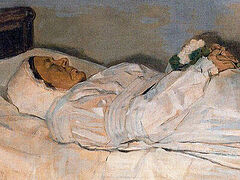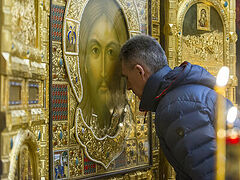 An illustration from the book, The Sixth Sense, by Priest Alexander Dyachenko
An illustration from the book, The Sixth Sense, by Priest Alexander Dyachenko
It is said that those who did not wish to repent of their sins during their lives on earth in the afterlife dream only of returning, if only for five minutes, to their earthly bodies and to repent. Because it can only be done here. A person may not believe in Christ and live his life like the famous dragonfly from the fable by Ivan Krylov (1769–1844) that had fun throughout the summer and did not care about the coming winter, and when faced with the Sky, was greatly disappointed. Having passed into eternity, a person who previously rejected it is forced to change his point of view. For him a period of knowledge comes, but the period of faith and hope will never come. And only faith blossoming with love is highly valued in eternity, and not knowledge with its statement of facts.
Speaking on this subject, we can refer to the authority of St. Ignatius (Brianchaninov) and other teachers of the Church. But I, an ordinary rural priest, also have some experience to share with readers.
Five minutes
Once, many years ago, in winter, after the end of the Vigil—that is, after eight in the evening, when we were already turning off the lights and getting ready to leave, a man and a woman, both aged about forty, entered the church.
“Will the priest be able to baptize our father?” these people, who turned out to be a brother and a sister, wondered.
“He is dying and asking to perform the sacrament right away.”
“Of course,” I replied. “Where will we go?”
“He wants to get baptized right in church.”
(“It’s strange,” I thought. “Healthy people are often slow to get to church, but here a dying man is going to do it! Are they going to carry him in their arms?... Although it’s their own business.”)
“Okay. I’ll be waiting for you,” I replied.
Half an hour later an elderly man in a blue tracksuit entered the church cheerfully, accompanied by his children. I noticed to myself that he didn’t look very much like a dying man. The fact is that in emergency situations we really baptize people “as soon as possible”, performing an emergency Baptism when someone’s life is in danger.
“Listen folks, your father looks quite cheerful. Can we postpone his Baptism until next Saturday and do it according to the schedule? We will prepare him and perform a normal Baptism, solemnly,” I suggested.
But the siblings were adamant:
“Batiushka, our father was already dead, then he suddenly came to his senses and demanded that we take him to church immediately. Please baptize him now, and later we’ll explain everything to you!”
I went up to the old man and asked him:
“Tell me, father, do you want to be baptized, or are they (I pointed towards his children) forcing you?”
“No, they aren’t. I myself want to be baptized.”
“Do you believe in Christ as God?”
“Now I believe,” he replied.
After I had performed the sacrament, the old man left the church just as cheerfully, without the help of his children. The next day we celebrated the Divine Liturgy. At the end of the service, as agreed, the old man was brought to Communion. He could no longer walk inside the church on his own—his daughter and son were dragging their father by the arms. The man took Communion and made the sign of the cross. Then they brought him back home and put him on the bed, where he lost consciousness and soon passed away.
Before the funeral service, the brother and the sister told me that the old man (I no longer remember his name) had been an ardent Communist all his life. Of course, he had never thought about any Church, God, or other “nonsense”. Whenever his religious children asked him to get baptized, he would take out his Party membership card, point to Lenin’s profile and declare: “That’s my God!” Even after becoming terminally ill, their father still refused to go to church.
He was a kind man, his family loved him and wanted to pray for him both during his illness and after his death. He was dying in their arms; he had already stopped breathing and his face had turned pale. Suddenly, he breathed in again, opened his eyes, sat up and demanded: “Baptize me immediately!” What had happened to him? Why did he come back to life? He never told anyone about it.
 An illustration from the book, The Sixth Sense, by Priest Alexander Dyachenko
An illustration from the book, The Sixth Sense, by Priest Alexander Dyachenko
* * *
Sasha [a diminutive form of the name Alexander.—Trans.], a veteran of the Great Patriotic War, used to live in our village. He was small, with dark bushy eyebrows and always had a smile on his face. He wore the same gray suit with an order attached to the lapel of his jacket. He was a widower, his daughters had moved away, but the old man always looked neat. I know that Sasha liked to drink, but I had never met him drunk. He had a neighbor, Lyusya [a diminutive form of the name Lyudmila.—Trans.], a woman of indeterminate age and also loved having a drink or two. Apparently, on the basis of loneliness and common interest, friendship developed between them. Once Lyusya called me and demanded:
“Sasha said he was given five minutes to live. Come quickly!”
The veteran was already dying, and his daughters had been called. I don’t remember the old man ever setting foot in church. Whenever he met me on the street, he followed me with his eyes as if he had suddenly seen a Papuan with feathers and war paint near his house. He never greeted me back, even if I made attempts to greet him. Apparently, my greetings baffled him, just as if a Papuan were suddenly to speak to him in the purest Russian. But I liked him. He wore the Great Patriotic War order, and I respect veterans. the old man would be pottering about at his dacha or near his cottage, nailing up some plank or pruning a tree. As I passed by, I would think: “Busy yourself with something, tinker with it, but just live, don’t die! We need you, veterans, and we will feel bad without you…”
When I arrived, Sasha was sitting on the bed in black trousers and a T-shirt. It was the first time we talked, and I understood why I had always liked him so much. The old man spoke about his youth, about the war he went to on the first day, about his severe wound in the abdomen and treatment in the hospital where he met Victory Day, about how he returned from the war as an invalid, got married and had two daughters. He recalled that after the war, despite his numerous awards, no one agreed to employ him because of his disability and his family was practically starving.
But the most painful thing in his life was that he had to kill at the front. He killed, each time acutely experiencing the very fact of killing a fellow human being. When it was time for him to die, he was not received there. He clearly heard the command: “Repent!” And he was also told, “You have five minutes.” However, after our conversation Sasha lived for another week…
When I was performing the funeral service over the old soldier (and it was held in his house), the drunken Lyusya said that she did not believe in “priests’ tales” and that Sasha had allegedly been “playing the fool” before his death. I had to tell her something like this, “Lyusya, I’m not interested in whether you believe or not, and we’re not serving the funeral for you! When it’s your turn to die, we’ll ask you.”
Lyusya started thinking about my words and fell silent. In silence, I was looking at the face of the deceased—a big child who had lived a long and sad life, raised children, known loneliness, had been offended and neglected, but had not become embittered and had not lost the ability to love. A fearless soldier who had gone through the war from the first day to the last, but never learned how to kill… He had experienced and endured much in his life. The only thing he had lacked was those very “five minutes” that Heaven gave him.
From the book, The Sixth Sense, Moscow: Sretensky Monastery Publishing House, 2022.




